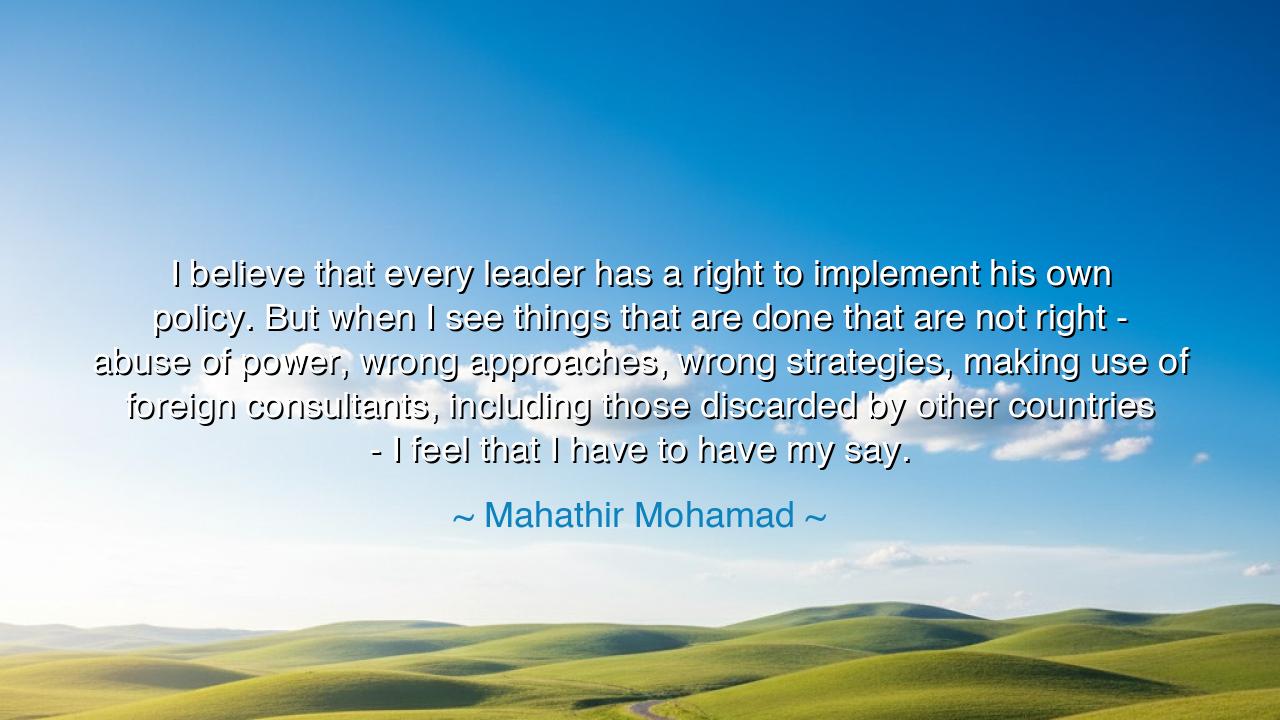
I believe that every leader has a right to implement his own
I believe that every leader has a right to implement his own policy. But when I see things that are done that are not right - abuse of power, wrong approaches, wrong strategies, making use of foreign consultants, including those discarded by other countries - I feel that I have to have my say.






Hearken, children of the ages, to the deliberate words of Mahathir Mohamad, who declared: “I believe that every leader has a right to implement his own policy. But when I see things that are done that are not right—abuse of power, wrong approaches, wrong strategies, making use of foreign consultants, including those discarded by other countries—I feel that I have to have my say.” In these words lies the eternal truth of responsibility, vigilance, and moral courage in leadership. Authority carries not only the right to act, but the sacred obligation to discern and correct that which is unjust or misguided.
Mahathir teaches that freedom of leadership is tempered by accountability. While each ruler may pursue their vision and implement policies, the wise recognize that not all actions are beneficial, nor all advisors wise. To witness abuse of power or flawed strategies without comment is to abandon the moral duty to guide, correct, and safeguard the welfare of the people. True leadership is not merely exercised by authority, but by the courage to speak against error and injustice.
Consider the life of Cato the Elder in the Roman Senate, who tirelessly spoke against corruption, mismanagement, and foreign influence despite the power of those around him. Though he did not wield absolute control, his voice became a moral compass for the republic, warning against mistaken policies and the influence of unworthy counsel. In this, Mahathir’s reflection finds its ancient parallel: wisdom and conscience compel one to have one’s say when governance strays from justice.
The ancients themselves understood the necessity of vigilance within power. Plato, Aristotle, and the Stoics all taught that a leader’s authority must be guided by virtue, reason, and the welfare of the many. Mahathir’s words echo this timeless insight: leadership is not a license for unbridled action, but a trust, and those who observe wrongdoing bear the duty to speak and guide toward right governance.
Thus, his counsel is both warning and exhortation: respect the autonomy of leaders, yet recognize that authority unchecked may falter in wisdom and justice. When policies go astray, strategies fail, or power is abused, moral courage demands that one raise their voice, offering guidance, critique, and redirection for the common good.
Carry this teaching, children of generations yet unborn: honor the right of leaders to act, but never surrender the responsibility to speak against folly, injustice, or poor counsel. In the balance of authority and accountability lies the enduring strength of governance, the preservation of justice, and the cultivation of wisdom for all who are entrusted with the welfare of the people.






DNAnh Duy Nguyen
This quote gives me mixed feelings. On one hand, it’s inspiring to see a leader willing to speak out against misuse of authority. On the other hand, it raises a question—does every leader have the wisdom to judge another’s policies fairly? Especially when politics is full of personal agendas and competing interests. I wonder if Mahathir is advocating for accountability or just expressing frustration with political incompetence and external influence.
HLHuy Le
There’s a sense of moral responsibility here that I admire. It feels like Mahathir is saying that loyalty to the truth must come before loyalty to any leader. But I can’t help wondering—what happens when this principle is applied by people with less integrity? Could constant criticism, even if well-intentioned, destabilize governance? I’d love to know how one can challenge power effectively without becoming part of the chaos they condemn.
HNTran Ho Nam
This makes me think about the fine line between patriotism and dissent. Mahathir seems to suggest that silence in the face of poor governance is a kind of complicity. I agree with that, but I also wonder—can too much public criticism weaken a nation’s confidence in its leaders? Is it possible to correct abuses of power while still maintaining respect for the office itself? That’s such a tricky moral balance to strike.
KN22. Tran Khanh Ngan
I find this statement quite courageous because it acknowledges the right of leadership while asserting the duty to speak against wrongdoing. But it makes me question—how does one distinguish between legitimate criticism and political rivalry? In real-world politics, motives are often questioned. Can such outspokenness coexist with party unity or national harmony, or does it inevitably create division? It’s an interesting dilemma of conscience versus political pragmatism.
TVPham Thi Vien
This quote strikes me as both bold and principled. It reflects the tension between respecting leadership autonomy and holding leaders accountable. I wonder, though, where the line should be drawn between constructive criticism and interference. When someone as influential as Mahathir speaks out, does it strengthen democracy by promoting accountability, or does it risk undermining authority and unity? How can a leader balance personal conviction with institutional loyalty?